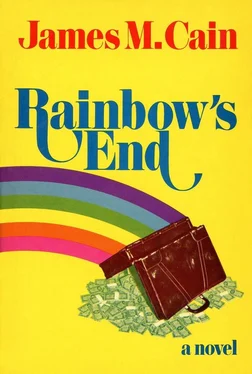James M. Cain
Rainbow’s End
It was the same old Saturday night Mom and I had been having off and on since my father died — or at least the man I had thought was my father. Here lately, the evening got started earlier than it had been starting, as the filling station where I worked was closed, with the sign hung on the pump: “Sorry, No Gas.” So there I’d be, home with Mom. But don’t get the idea that things were slow or that time dragged. Plenty was going on, a little too much, for my taste, and too lively. The first part — in the early evening — wasn’t too bad, just screwy, which, of course, there’s no law against. She’d begin talking about how rich we would be by and by, pretty soon, one of these days, and tonight was extra special on account of the rainbow she’d seen late in the afternoon, after the rain when the sun came out.
“And you know, Dave,” she whispered, “what’s under the end of that bow — a pot of gold, that’s what. It’s waiting for us, I can feel it — if we just show some gump. If we take the car next week, go out there and get it.”
“There’s a road to the end of that bow?”
“You know what I mean.”
“No, I don’t.”
Because she’d meant so many things at one time or another, I’d more or less lost track. Like for a while she meant oil, insisting it ought to be drilled for on our land, and then we’d get royalties on it, “thousands and thousands.” I told her southern Ohio was all drilled out. “They used to have oil here,” I explained, “but that was years ago, and there’s no more to be had — on our land or any other.” Then for a while she meant Marriott. She’d read about Marriott in the papers, that he should locate a park on our land, with roller coasters, ferris wheels, and on the river a steamboat ride.
Our place is on the Muskingum, ten miles up from Marietta, or two places, actually — small farms next to each other that we grew produce on, she doing most of the work, me helping her when I could, with hired labor when we needed it. It’s true that steamers once ran on the river, but I didn’t know any way of getting Marriott up here. She’d meant other things too, each one goofier than the last, so what she meant now I didn’t exactly know, but I let her tell me; I knew I’d have no peace till she did.
“OK, what is it?” I asked.
“Well,” she began, drawing a long, trembling breath, “this time it can be done — by us. We don’t have to ask nobody. We just up and go — drive over in our car when we get good and ready to take advantage.”
“Of what?”
“Because this time we can—”
“Will you for God’s sake say it?”
“It’s in Maryland. We drive over to Cumberland, which is less than a day’s trip, and—”
“Yeah? And what?”
“Buy us lottery tickets.”
So, all that puffing and poofing, and she come up with this. But she was small and young and pretty in her freckle-faced mountain way, and I knew by then that she lived in a world of dreams. So I kissed her and told her: “Fine, we’ll drive over to Cumberland — that’s the place? — next month when the roads dry off. Right now, everything’s flooded, and we’d be up to our hubcaps in water. But soon as it goes down we’ll go and buy ourself a ticket.”
“More than one, Dave — we have to buy a bunch. That way, you’re bound to win.”
That wasn’t the way I’d heard it, but I went along and for a while kept her company pretending. Then after a while I asked: “So OK, we cash a ticket — then what?”
“Well, we’ll be rich.”
“I asked you: and then what? ”
“ Then... with all that money we could sell this place, sell the other place too, and sit back and—”
“And what?”
“Whatever we want.”
We had two places because I’d bought a second one after my father died — her husband, I mean — in addition to the place we had when he was alive. That place he had built himself in the only way he knew — with a hammer, saw, lumber, and his two hands. A ranchhouse, he called it. He was from Texas, and when he went into the army, he had been put on recruiting duty in Marietta, where she was slinging hash in a lunchroom. She was from Flint, West Virginia, then a coal camp on the Monongahela, now a ghost town, with the mine closed down, though a strip crew has started work on the other side of the mountain. She’d worked first in Fairmont, down the river from Flint, but she got let out after a row she got into. That’s when she crossed to Ohio. I asked her once why she came so far instead of picking Clarksburg which was just down the road. “I don’t like Clarksburg too well,” she told me, but once when I was over there I found out the reason. She was a Giles, and back of Clarksburg the place is full of Kings. A Giles doesn’t come near a King, on account it’s not healthy. I’m trying to explain her a little, how being “mountain” caused her to be like she was.
So they got married, she and Jody Howell, and he bought the other place with the money they’d both saved and built the house himself. He built it the way he knew from Texas: square, cut up into four rooms with connecting doors, two front doors, two back doors, a front porch, and a kitchen out in the back yard. However, a house that’s perfect for Texas is cold as death in Ohio. When winter came, we almost froze. When I was 16 he came down with galloping TB and sat out on the porch all day with a cup beside him to spit in, “chasing the cure,” as they call it. Then he died. He had never told us he carried insurance, but a check for $10,000 came, made out to me. With the money I made a down payment on the place next to us, $9,000 against the price of $22,000, and we moved to the new house. She was bitter toward him, that he carried insurance for me, “and not one cent” for her. That’s when it started up, her acting so peculiar, which is what I’m leading to. I’m not going to apologize for beating around the bush a little bit; the way I feel about it, I could beat around the tree, even a whole forest full of trees.
OK, then, I’ll say it: she made passes at me. After talking about the gold, the money we would make one way or another, she’d catch hold of my hand, pull it around her, and draw it across her breast that was full and warm and soft. It scared me to death and then some. I’ve been trying to say she was mountain, and I’d heard of stuff like that — of mothers that fell for their boys, and vice versa, fathers and daughters.
It sounds funny, but you have to remember that mountain boys of 16 can load just as much coal as pappy, so when they work in the mines, they get married, mostly to girls of 14, maybe younger. Well, when Sonny comes sweet 16, never been kissed, a goodlooking boy with muscles, mommy’s still in her twenties, with ideas no older than that. And of course it kind of works backwards, with pappy and Sissy, soon as he notices her. I’m trying to say when you run into something like that, that you hardly dare to believe, you generally find there’s a reason. With Mom, there was her looks on top of her age. She was still in her thirties, and I was just 22. She was medium, verging on small, with dusty blond hair, light blue eyes, pale skin, and freckles, and a body no man could forget.
But I’m still beating around the bush. I’m trying to say: what scared me to death was that if she was mountain, I was too or at least so I thought. It turned out I actually was, though in a different way than I’d supposed. If I was mountain, maybe I wanted my hand to be there as much as she did. I had a horror about it, that we might be headed for something like going over the dam nine miles down the Muskingum.
So all of a sudden I said, “Time for bed.
Читать дальше









![Джеймс Кейн - Почтальон всегда звонит дважды [сборник litres]](/books/412339/dzhejms-kejn-pochtalon-vsegda-zvonit-dvazhdy-sborni-thumb.webp)

